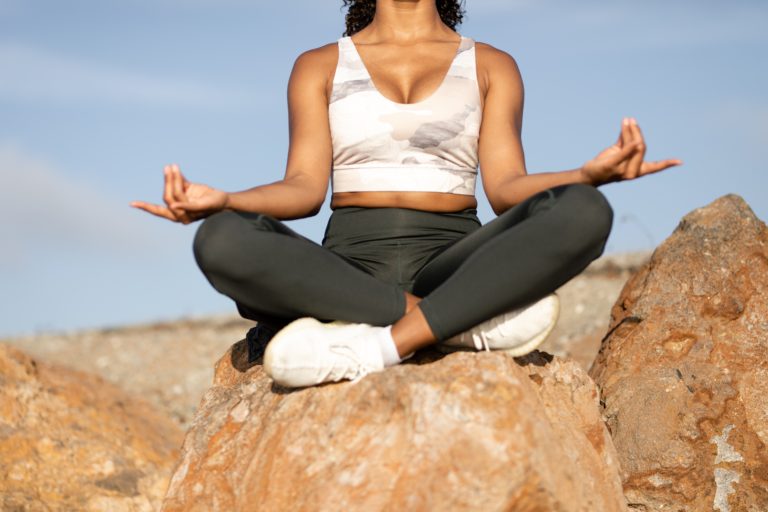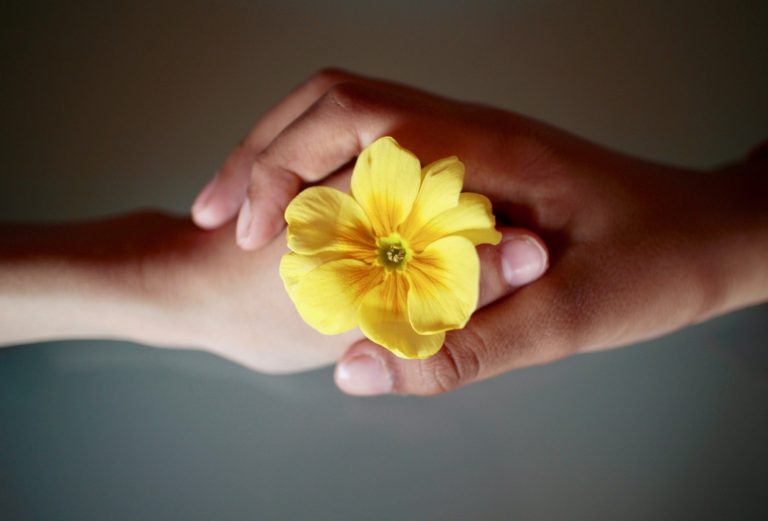(Easy) Coping Skills You Can Use in Under 5 Minutes!
During the moment of a crisis, it feels like the entire world is falling apart. Hope quickly vanishes and we struggle to find any way out.
The experience is so intense, it consumes everything and feels as though it will go on forever.
If you experience frequent breakdowns, then you know exactly what I’m talking about.
‘Breakdown’ may as well be my middle name because I have them all the time!
When I especially struggled with my mental health in the past, I used to suffer from breakdowns on a daily basis, often having multiple episodes in one day.
It was unbearable.
But over time and with a lot of practice, I’ve been able to mitigate the amount of time I spend in crises. It has been so freeing and seriously life-changing!

Because when you learn that you are the one who is in control (and not your emotions or thoughts) you are able to take action when things are going south and help yourself get out of crisis mode.
You Can Do It!
The power really is within you!
I know it is hard and at certain times it even seems impossible, but trust me when I say that you are strong!
You are capable of anything you put your mind to and you can overcome any breakdown! Believe in yourself, because you got this.
And I am here to help! Over the years I’ve learned lots of different coping skills that can really come in handy when you are experiencing a mental health crisis.
Today I want to share a few of the ones that you can actually use in 5 minutes or less!
Seriously. Using coping skills and getting back on track does not have to take hours (yes, it takes me forever sometimes, too).
Some of these you can even do in a minute. Now that is convenience at its finest!
Why Coping Skills are Helpful
It’s nice to have coping skills like these in your back pocket for those especially inconvenient times when crisis sneaks up on you.
You know, like when you’re at work, when you need to go to an important family function, or when you’re trying to be there for someone else.
You can practice these coping skills so that you’re prepared to use them in a pinch anytime you start to feel like you’re taking a dip.

Oh, and did I mention that they’re pretty simple?
Yep! Totally simple, quick, and effective coping skills! Sounds too good to be true, I know. I only wish I would have learned these much earlier in life!
The hardest part is practicing, but trust me it will come with time. I’ll also give you some pointers on how to implement these so that you can get the most out of your coping skills.
So let’s get to it!
Quick Coping Skills that Work Fast
1. The Senses Count
Okay, I know it sounds a little weird and I guess that it kind of is, but this is actually one of my favorite go-to coping skills!
I sometimes refer to it as 54321 Senses because you’re basically just counting down the things you can sense at the moment.
You start with the number 5 and choose 5 things that you can see right then. It can be anything around you. Then either aloud or in your head, list 5 things that you see.
Next, list 4 things you hear. Then 3 things you can feel or touch. List 2 things you can smell, and finally list one thing you can taste.
The activity is straightforward in principle, but it helps to distract your mind from the crisis at hand.
The Senses Count is a grounding technique to bring you back into the present moment and help your mind and body feel more at ease.

And while the principle may be basic, it is not always easy to complete this activity! It starts off easier and gets progressively harder, but that is actually one of the things that makes it so great.
The exercise begins by distracting your mind with something simple, then forces it to concentrate as the tasks get slightly more difficult.
By the time you complete the skill, you’ve evaded the crisis because you’ve distracted your brain from it and reconnected with your rational mode.
This coping skill is especially helpful if you’re struggling with depression or anxiety. I like to use it when I am getting really down or when I am having an anxiety attack.
2. ABC Naming
This one is pretty similar to the first one and is another great skill to utilize. Put your lifelong knowledge of the alphabet to good use!
ABC Naming is really good at distracting your brain from the crisis and drawing your focus elsewhere. It is another technique that helps ground you and connect you to the present moment.
Here’s how you put it into practice!
Start at the beginning of the alphabet and find something in your environment that begins with the letter A. It can be anything at all.
Take a look at the objects around you until you find one, and then move on to the next letter.
Continue going through the alphabet finding objects in your surroundings that begin with a specific letter until you complete the alphabet or until you feel better.
If you get stuck on a letter, don’t worry about it. Try to find something in your environment that starts with that letter, and then move on to the next one if you can’t find anything.
As long as you still try, the activity will help!

This skill can take a little longer than the first one, but it still only takes a couple of minutes and it can really help you get back on track!
It’s another one of those quick skills I like to keep in my emergency mental health kit for those tough times.
4. Deep Breathing
While it may seem elementary, focusing on your breath and practicing some deep breathing in times of crisis can help calm your mind and senses.
You can pause and take a few slow, deep breaths, or you can practice one of the many breathing techniques out there.
Here is a simple place to start if you’re looking for a breathing technique to practice:
- Begin by standing and holding your arms down at your side with your palms open and facing forward.
- Slowly breathe in, taking a deep breath as you count to 10. If you do not get to 10 before you run out of lung capacity, it is okay. Take a mental note of what number you reached.
- Hold your breath for 1 second, then slowly begin a steady exhale, again counting to 10. Empty your lungs as much as possible.
- Once your lungs are empty, immediately begin breathing in again, counting to 10 and repeating the process.
- Do this until you are able to to count to 10 while breathing in and again while breathing out.

I like using this breathing pattern when I am feeling overwhelmed with anxiety or when I feel my heart or thoughts are racing.
It is another good grounding technique, but it is also great for getting your breathing under control and helping your body to feel calmer.
It’s a useful breathing technique to use when you’re experiencing an anxiety attack, when you’re stressed, overwhelmed, or anytime you want to calm your mind and heart rate.
You can practice any breathing technique that works for you, and feel free to modify the one above to fit your needs!
4. Progressive Relaxation
Progressive relaxation is another excellent technique for calming the mind and body.
The idea is to focus on individual parts of your body and slowly begin to relax each one until you feel more at ease.
It is easier to do either seated or lying down, but it can be practiced standing up as well. Begin by focusing your attention on your feet. Slowly tense all of the muscles in both of your feet at once.
Hold for 3 seconds and then release. Move to your lower legs, focusing on your calves and shins. Tense your muscles and then release.
Continue moving up your body, tightening and relaxing your muscles until you’ve reached the top of your head.

By the end of the exercise, your body will feel more relaxed, and your mind will feel more focused. If you do not feel this way, you can repeat the exercise as many times as you’d like.
I really like this technique to help when I am experiencing a lot of anger. It is also really great to use when I’m anxious or feeling overwhelmed.
Tips for Success
I want to share a couple of tips on how you can get the most out of these coping skills!
Because when we learn to manage our moments of crisis, we don’t allow our breakdowns to control our lifestyle. Now that is a big win!
Here are some things to keep in mind:
- Practice coping skills when you are not in crisis mode to help them become established and easier to use in a crisis
- Keep a list of coping skills on your phone, at your desk, posted to your mirror, etc. to help you remember to practice and use them in times of need
- Find a partner to practice the exercises with. They can be especially nice to do with your partner or anyone in your support group.
- Pair up the coping skills. If doing one exercise does not seem to help, practice another immediately afterwards.
- Modify the skills to fit your needs. As long as the foundational principles are still there, the exercise will work.
- Be patient with yourself, it takes time to establish new habits. Practicing self-love along with these coping skills will help them be more successful
* * *
Don’t let your crisis get the best of you! When we combat crises, we can shorten our experience of them. This helps us to better manage our mental health and get back to focusing on our goals.
These quick skills can really be a game-changer when it comes to staying on track and overcoming those tough moments.
Use The Senses Count or ABC Identify to ground your thoughts and bring you back into reality. Practice deep breathing to calm your mind and ease anxiety.
Turn to progressive relaxation when you need to alleviate stress and regain focus.

Doing these things not only helps you in moments of crisis, but also helps support an overall healthy mentality.
Remember that you have the power to control your thoughts and you have the strength to manage your mental health!
How will you handle your next crisis?
Find out my top advice for managing negative thoughts.






